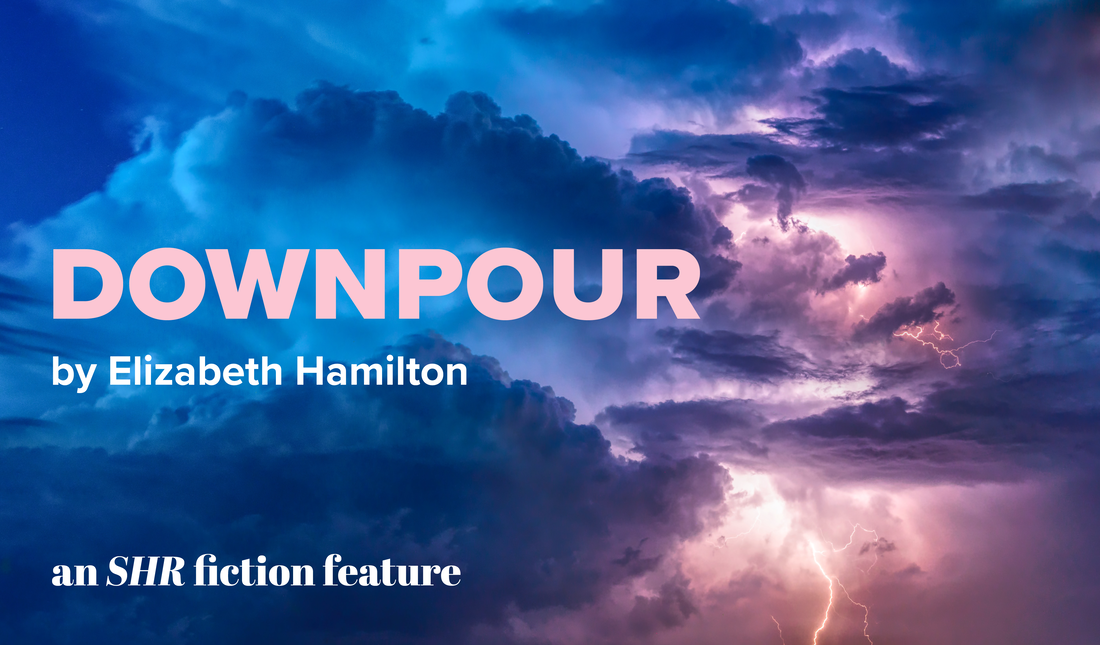Meg is alone in their room at the Texas Inn, staring out the grubby window across the highway at a vast, growing thundercloud. The sun is setting behind the cloud, turning it blush pink at the bottom, corn yellow in the center, and bright white at the top. She wonders when the thunderstorm will hit, if it will hit before her husband and daughter return from the pool.
When they asked if she wanted to join them, Meg said she needed some “alone time.” For the past three days, on their journey from Santa Fe to Houston and back again, she has been reading The Little Flower during stolen moments when her daughter is asleep or watching YouTube Kids or playing make believe on a plastic park swing. She is certain The Little Flower is going to save her. She believes this because a librarian recommended the book to her, saying, “This book saved my life, maybe you’ll like it,” and she trusts the recommendations of librarians as if they are modern-day prophets.
When Meg reads The Little Flower, she isn’t afraid of the nonexistent money. She trusts the child’s voice traveling to her across space and time, saying, “The more we would surrender ourselves to Love, the more we must surrender ourselves to suffering.” To be fair, Meg isn’t entirely sure what this means. She only knows that she is suffering—from fear about the money, yes, but also a general, ongoing disappointment with her life—and The Little Flower makes suffering sound not only meaningful, but necessary.
If Meg stands at the far-left side of the window and presses her cheek almost against the pane—she’s too disgusted to actually touch it—she can see her husband and daughter splashing about in the outdoor pool. The pool is the sparkly crystal blue of chemicals and cheap concrete. A cleaning robot sweeps the bottom, occasionally spurting a long jet of water through the air. Meg’s daughter wears a floral swimsuit, goggles strapped like bug eyes to her head, inflatable pool arms keeping her afloat. Occasionally, Meg’s husband sneaks up on her daughter like a shark and tosses her effortlessly into the sky. Her daughter shrieks in protest and begs him to do it again.
Meg goes to lie on the bed, then remembers her husband has left his watercolors not only leaning against every empty wall, but on top of the unusably small desk, the bedside table, and the mattress where she wants to lie down. The paintings are wrapped in brown packaging paper, but she knows the one lying on the bed is of Sacré-Cœur because it is by far the largest. Her husband painted it in Paris three summers ago, when they were living off the grant money from the Texas Council on Arts and Culture. He dutifully painted dozens of lone cowboys riding across the desert plains per the grant’s stipulation that he “paint iconic scenes of Texas history and culture,” but the money was fungible so of course they had to go at least once to Paris. If Meg had known about The Little Flower when they were in Paris, she would have visited Lisieux, taking her daughter with her on the train out of the city into the French countryside. She wonders if she will ever have the opportunity again. She edges the painting over on the bed as far as she dares without risking its clattering to the floor, then lies down on the narrow free space, turns on the dim lamp, and begins to read.
Tomorrow, after they pay for the asbestos-infested room, fill the gas tank, drink coffee and eat breakfast at a McDonald’s, they should have roughly $275 left. More than enough to get them to Santa Fe, but then what? Meg goes over the list of bills to pay as she rinses the soap off her daughter’s wriggling legs with a thin washcloth and lukewarm water: rent, utilities, groceries, cell phone coverage, car insurance. She doesn’t worry about health insurance or internet service anymore. But she forgot about dinner tonight, so that puts them around $250, $260 if she and her husband split a meal.
Meg wishes she still had her job at Costco; why had she quit? But her husband was so certain the Houston Public Library would choose him for a commission to paint a mural on the history of Texas, beginning with the Native Americans on through the Spanish conquest, Texas Independence, the Alamo, Sam Houston, the oil fields of T. Boone Pickens, both Bushes, and modern-day cowboy culture. When Meg releases her daughter from the bathroom, she sees from where she squats on the mucky tile floor the many wrapped paintings reposing about the bedroom, each accusing her of neglecting not only her daughter and her husband, but herself, her life.
A long time ago, Meg wanted to be something other than the mother of a beautiful girl, the wife of a mediocre painter, but she’s never figured out what, exactly. Meg envies her husband, who has always had paint in his veins. That’s how he can withstand the rejection, the uncertainty, the debt. And she admires The Little Flower, who never once doubted her vocation as a nun, even as she cloistered herself in a dank convent without sex, or food, or wine, except for the communal wine, only to die (from TB probably hastened by the dankness) at twenty-four. If only Meg had such conviction.
For a moment, Meg imagines they are the only people left on earth. Behind them, the Texas Inn is a desolate three-story building comprised of tidy, empty cells. Around them, the flat prairie extends, east into the night, west toward the setting sun and the supercell. The three of them are meager dots, as tiny and insignificant as the fire ants crawling up through the jagged cracks in the concrete near the diving board, which Meg warned her daughter to avoid. The quietly raging supercell is like a pillar of fire, but instead of leading them toward a land of milk and honey—how she wishes they had honey!—it moves upon them in furious thunder, relentless rain.
The Little Flower believed desire pointed the way toward destiny. “God would never inspire me with desires which cannot be realized; so, in spite of my littleness, I can hope to be a saint.” Meg desires stability, a full-course meal, a return trip to Paris. But the distance between her desire and any possible fulfillment seems so far, and she contents herself with a sizable swig of tangy wine instead. Her husband drapes his arm around the back of their daughter’s chair, his fingers resting lightly on Meg’s bare shoulder. She feels each individual fingertip as if it is charged. Meg tries to believe in him, in his work, but briefly she wishes she’d married an accountant instead.
Her husband yelps and rushes to the windows, blown open by the wind. Rain lashes his face as he slams them shut, locking them against the torrent. But the damage is done. He groans, standing in the circle of his paintings. The brown paper is black with rainwater. He rips off the paper, painting by painting, leaving jagged strips on the drenched carpet. Meg watches from the door, seeing even in the bad fluorescent light the discoloration along each watercolor’s edge, the smear of a cowboy’s face, a botched sunset, a smudge where a longhorn should stand. At last, he tears the paper from the Sacré-Cœur, kneels at the bed, both hands clutching either side of the gold frame.
Meg sets her daughter down, takes her hand, moves to stoop beside her husband. On the bedside table beside her ear lies the sopping paperback copy of The Little Flower, the pages flapped open by the wind. She’s tempted to read what it says on the random, open page, as if The Little Flower herself might speak to her again from the past and tell her what to do. Perhaps, written on the page she will find this: “Clearly we must not be attached to anything, no matter how innocent, because it will slip from our grasp when least expected; nothing but the eternal can content us.” But Meg doesn’t look; the present is upon her.
The Sacré-Cœur is ruined. Pieces of wet brown paper stick to the cathedral. A pool of rainwater blurs the white steeple into the red sunset; the cathedral now looks like a soft, bleeding breast. Meg’s husband falls on the painting, pressing his cheek against the cathedral’s distorted frame as if an embrace could restore its glory. When at last he unsticks his cheek, he comes away with a pink stain running from his left eyebrow, across his cheek, and down his neck, like a wound. Meg sees the vein beating in his neck and wants to kiss it, wants the paint on her lips.
|
|



